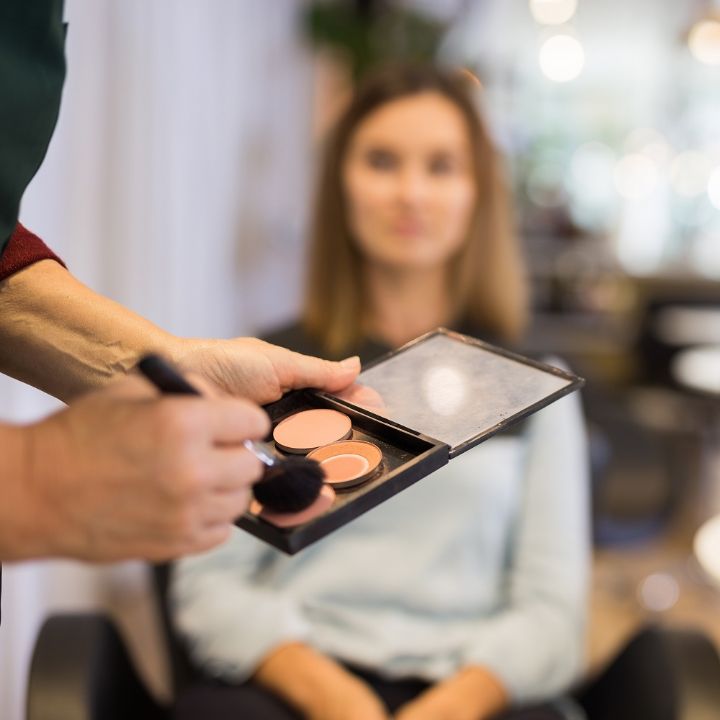
So, you’ve decided to pursue your dreams of becoming a professional MUA. Awesome! To work in this field, you will need to learn how to get clients as a makeup artist.
Luckily, you’ve come to the right place!
Today, we’re going to break down 6 efficient ways you can market yourself. In turn, this will help you find makeup clients and get your business off the ground.
So, let’s get started!
How Do Makeup Artists Get Noticed?
If you’re serious about pursuing this as a legitimate career, you’re likely researching how to grow as a makeup artist. You want to learn how to stand out, build client relationships, and maintain them. Here’s the good news: in today’s day and age, there are all sorts of ways for you to get your name out there and gain exposure!
For starters, there’s the tried-and-true method of word-of-mouth. Referrals have been a staple networking strategy for as far back as we can remember… and with good reason! If a trusted person recommends your services to their friends, family, colleagues, etc., others may be more inclined to look into your business and give you a try.
Plus, there’s also the online world to consider, too. We all live online nowadays. Thus, a large portion of your marketing efforts will need to be tailored to the digital platform. Between business websites, paid advertisements, and social media platforms, there’s a lot of competition out there. As with word of mouth, getting strong client testimonials is everything.
This means that if you want to stand out as a makeup artist and get noticed, you’ll NEED to maximize your presence online, build relationships, and plan out your strategy wisely.

The Stats Don’t Lie
HubSpot’s “Ultimate List of Marketing Statistics for 2024” provides the following data which supports the efficacy of online marketing:
- “39% of marketers list optimizing on-page content based on keywords as their top SEO strategy (Hubspot State of Marketing Report, 2023)”
- “80% of Gen Z, 62% of millennials, 66% of Gen X, 35% of Boomers, and 52% of the general population primarily use mobile search (Hubspot State of Marketing Report, 2023)”
- “About 90% of people think voice search is easier and faster than traditional search (TechReport, 2023)”
- “Facebook is the most popular social media platform marketers used in 2023, and marketers report that it has a better ROI than every other platform”
- “Instagram Live has the highest ROI of any Instagram content format and is the most effective for gaining followers and shares (Hubspot State of Marketing Report, 2023)”
- “Instagram posts generate 23% more engagement than Facebook, even though Facebook has twice as many monthly users (Hubspot State of Marketing Report, 2023)”
- “Social media is the most preferred product discovery platform for consumers aged 18 to 44 (Hubspot State of Marketing Report, 2023)”
- “66% of social media marketers report that funny content is the most effective for their brand, followed by relatable content (63%) and trendy content (59%) (HubSpot State of Marketing Report, 2023).”
- “Infographics are 30 times more likely to be read than a written article, and they can increase website traffic by up to 12% (DemandSage, 2023)”
- “71% of videos created by companies are made for use on social media (HubSpot State of Marketing Report, 2023).”
- “22% of marketers have incorporated YouTube Stories into their video marketing strategy (Social Media Examiner, 2023)”
- “Businesses that prioritize social selling are 51% more likely to reach their sales quotas (LinkedIn, 2023)”
How Do You Brand Yourself as a Makeup Artist?
Think of your “brand” as your unique fingerprint in the makeup industry. It’s the thing that’ll set you apart from other MUAs. Your brand is your business’s identity and personality. Moreover, it’ll will make you memorable in the minds of prospective clients and online followers.
A makeup artist who’s developed a solid brand will be much more likely to secure customers than a makeup artist without one.
Consider the following companies, for example:
- Nike
- McDonalds
- MAC Cosmetics
- Coca-Cola
- Netflix
Each name alone probably sparks something in your mind, be it a color, a logo, an emotion, a purpose, a belief, etc. This is the case because these companies strategically worked hard to associate those specific things to their brand. That way, whenever someone – such as yourself – sees their company name, their mind will naturally go to the exact place that business wants it to go.
This is proper branding.
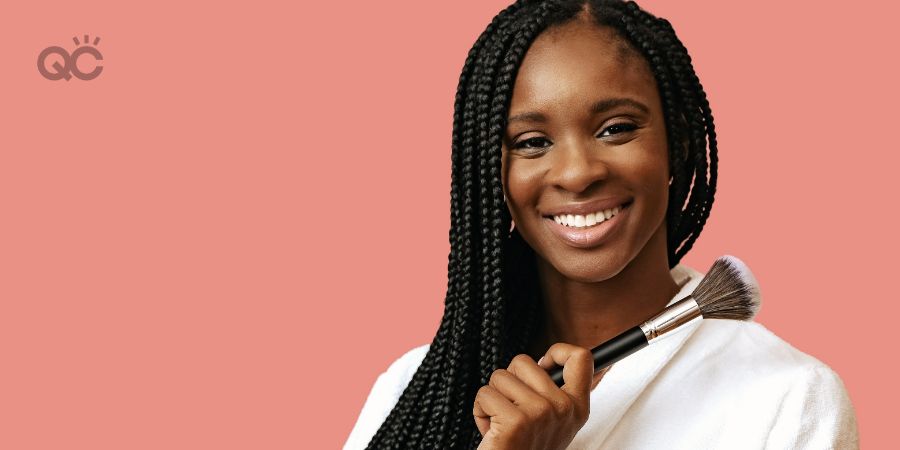
So, how can YOU achieve this for your own business? Our recommendation is to first sit down, grab a pen and paper, and answer the following questions:
- Are there any particular colors you’d like to be associated with your makeup business?
- What mood(s) or emotion(s) do you want people to automatic think of when they think of your business?
- What makeup (and other beauty services, if applicable) would you like to offer?
- Who is your target clientele?
- Do you intend to strictly work locally, or would you also like to offer virtual makeup services as well?
- Do you have a unique niche/would you like to have a unique niche?
- Would you like your beauty business to embody a particular message and/or belief that’s near and dear to you?
- Do you want your business to have a unique logo?
Coming up with clear, concise answers to all of these questions will help you brand yourself as a makeup artist. In turn, this will make it even easier to get clients!
Did you know that QC Makeup Academy’s self-paced, online certification training can help you identify your brand and apply it to your business model successfully? It’s true! Check out our full list of courses here!
6 Ways to Get Clients as a Makeup Artist
1. Build Up a Creative Portfolio
Your portfolio will show off high-quality images of makeup applications you’ve done on past clients and/or models. Basically, it’ll be physical proof of the quality of work you can do.
If you don’t have a professional makeup portfolio, you’ll have a hard time getting clients.
This is because, especially these days, prospective customers want to know that you can give them what they want, before they invest any money into your business. Asking potential clients to book you on a leap of faith alone is unrealistic – and frankly, a bad business move.
If it’s between you (without a portfolio) and another MUA (with an impressive portfolio), guess who the person is going to pick?
Not you.
If you need help getting started, here’s a small handful of our past blog articles that can guide you in the right direction:
- 5 Looks Every Makeup Artist Should Have in Their Portfolio
- 5 Things You Need to Take AMAZING Makeup Portfolio Photos
- Building a Portfolio: What Every Makeup Artist Should Know
- Building Your Makeup Portfolio: How to Connect with Photographers
- The 6 Best Ways to Market Your Makeup Portfolio
- Avoid These 4 Rookie Mistakes in Your Makeup Portfolio
- 18 Secrets to Makeup Photography Success
Want to develop the ULTIMATE makeup portfolio? Enroll in QC Makeup Academy’s Master Makeup Artistry course and learn everything you need to know in as little as 3-6 months!
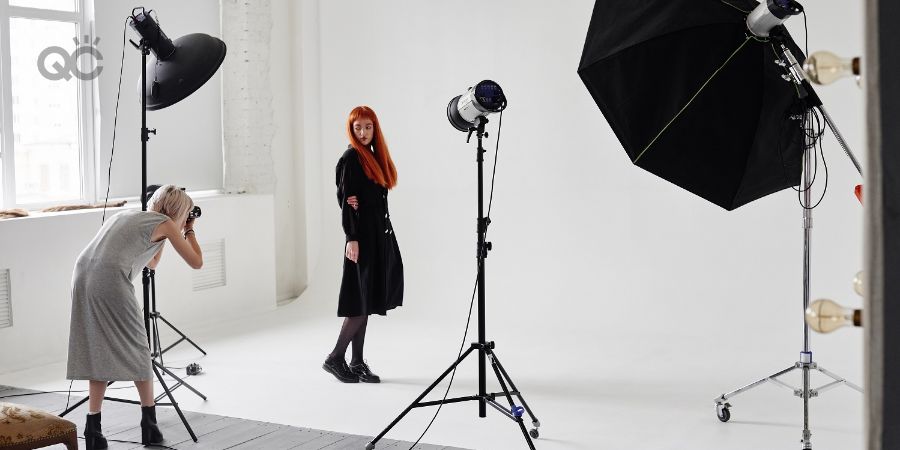
2. Start Your Own Website
If you want to get clients as a makeup artist, a professional business website will be a MUST! Without your own site, you’ll be missing out on so many booking opportunities. Plus, and I cannot stress this enough, it’ll make you look unprofessional.
If your budget allows for it, you can always hire a professional website developer to create one for you. But if you don’t have the money for this, that’s okay! Luckily, there are all sorts of free website builders and hosts out there with simple, user-friendly templates that you can work off of.
Either way, it’s important to make sure that your business website contains the following key information:
- An “About Me” page where people can better get to know you and your makeup experience, qualifications, certification(s), etc.;
- A full list of all makeup/beauty services you currently offer, as well as rates (should you wish to disclose this information upfront);
- Your credentials
- Client reviews/testimonials;
- Working links to your social media profiles;
- Accurate contact information;
- Your professional makeup/beauty portfolio;
- An option for online booking.
3. Show Off Your Skills on Social Media
As we already established earlier, social media marketing will be one of your BEST friends! After all, literally everyone uses social media these days. It’s undoubtedly one of the single best ways to meet others in the industry and attract clients as a makeup artist.
Facebook, Instagram, TikTok, YouTube, and Pinterest are all examples of extremely popular platforms on which you can establish a solid presence.
When the time comes that you’re ready to set up your social media accounts, keep these useful tips in mind:
- Your social media handles should be the same as your registered business name.
- Always link viewers back to your website (e.g. through your bio links, written content, etc.).
- The aesthetic of your social media platforms (such as what you post, the colors you use, how you speak, etc.) should always reflect your brand.
- Post original content – and post on a regular basis.
- Always be fresh and innovative in your posts. You don’t want to be the same as all the other MUAs out there. Otherwise, your channel(s) might be easily forgettable!
- Follow others in the makeup/beauty industry that you’d like to connect with, and regularly leave encouraging comments on their posts. Chances will be better that they’ll then do the same with you!
- Whenever someone takes the time to engage with your posts and/or send you a private message, make sure YOU take the time to acknowledge and reply to them.
- Use your social media channels as yet another way to showcase your makeup portfolio and promote your business!
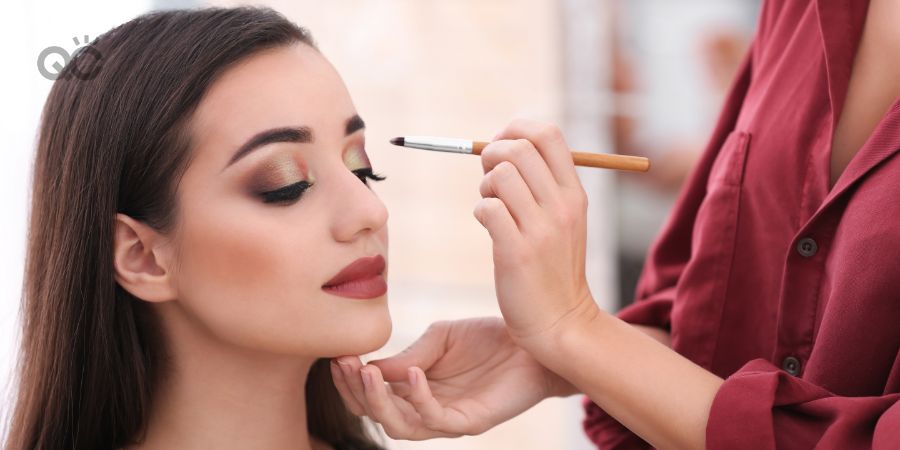
4. Start a YouTube Channel
Makeup enthusiasts love watching MUAs; be it tutorials, product reviews, makeup challenges, etc. While other popular social media platforms – such as TikTok and Instagram Reels – are great for posting condensed, shortened videos, their time constraints can be limiting.
For that reason, we also recommend launching your very own YouTube channel!
YouTube is a wonderful platform to share your content on, especially for videos exceeding 3 minutes in length. Furthermore, it’s so easy to tie your YouTube content to what you post on other platforms. For instance, you could easily tease at a new video by posting enticing clips on TikTok or Instagram, and then encourage your following to watch the FULL video on your YouTube channel.
Not to mention, if you happen to amass a large following, you could also earn some side coin from the money you’d get paid from YouTube! Either way, more platforms for your business = more opportunities for prospective clients to find your business and book you.
It’s a win-win!
What are some of the most important DO’S and DON’TS of beauty vlogging? Find out here!
5. Network, Network, Network
The beauty industry is quite unique, in that everyone seems to know each other. Indeed, if you establish a positive reputation for both yourself and your business, it’ll get around and other MUAs will know all about you.
(Of course, the same can be said if you develop a bad reputation, too…)
One important thing to understand early on in your career is that other makeup artists are your FRIENDS – and not your enemies. Yes, they’re considered your “competition”. But at the end of the day, you all have the same goal: to transform clients’ lives for the better.
So, get to know the other beauty experts in your town or city! In addition to other makeup artists, connect with photographers, hair stylists, fashion stylists, etc. The benefits of proper networking are endless, and here are just some of the reasons why:
- If another makeup artist’s schedule is completely booked, they could wind up referring a prospective client to YOUR business!
- Similarly, if you’re the one totally booked up, you can help out people in need by referring them to talented MUAs that you recommend!
- You can potentially collaborate with other beauty experts in your area!
- If you get to know some local photographers, you could work with them on stylized photoshoots – which will help you build your professional makeup portfolio!
- Others in the general beauty industry (i.e. hair stylists, skin consultants, etc.) could refer clients to you and/or request your help for a client they’re already working with!
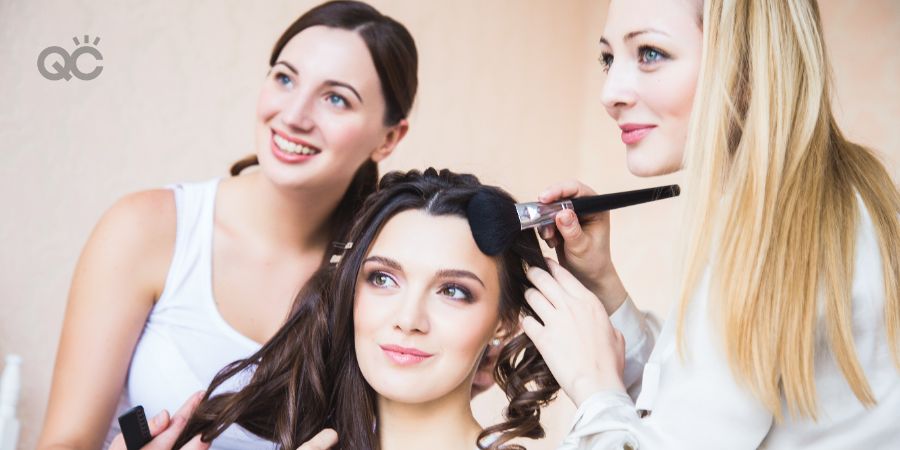
6. Ask for Referrals
Nothing ventured, nothing gained, right? There’s NO harm in straight-up asking for referrals, so long as it’s done tactfully!
Thanking Your Clients
Before asking for a referral, you want to ensure your client has the best experience possible from start to finish. A way to set you apart, show appreciation, and have your client remember you is a simple thank you note. Thanking your clients will help build a genuine and strong relationship, making your work more fulfilling and putting you in a stronger position to ask them to recommend you to others.
Asking Clients
Once you’re done working with a satisfied customer, you can casually let them know that if they know anyone in need of professional makeup services, you’d be happy to work with them.
You can also provide a customer survey for them to fill out and include that request somewhere on the form. Using a survey is a great tactic because it also gives you client feedback which you can use to help improve the client experience and retain your makeup clients.
(But also, don’t forget to ask for a testimonial from that particular client. Remember: you can use this for your website and social media channels!)
Asking Friends and Family
Another option is to ask for referrals from the people you know personally. For instance, do you have a friend who’s getting married in the near future? What about a family member about to celebrate their birthday?
YOU can assist them by helping them look and feel their best on their big day!
By maximizing your personal connections, you’ll be able to acquire the materials needed (such as photos and success stories) to develop your professional portfolio and further elevate your website. Plus, your friends and family can also give you positive feedback that can then be added to the testimonials page on your site and social media posts.
And just as importantly, they can help spread word about your makeup business by recommending you to people they know!
There’s absolutely nothing wrong with drawing from your inner circle and getting some help, especially when you’re first getting your makeup career started. So, don’t hesitate to reach out to the people you trust and see if there’s any way you can lend your services to them!
Can you think of other ways to get clients as a makeup artist? Drop them in the comments below!